Departure Date: May 18 - 26, 2025
Compiled By: Michael O'Brien
Trip Leaders: Michael O'Brien, Louise Zemaitis
Toll Free: 800.328.8368
Phone: 512.328.5221
Midwest Warblers 5/18/2025-5/26/2025

Spring in the Midwest is a season of highly variable weather. When skies are clear and winds blow from the south, it can be quite warm. But when winds blow from the north, and cloudy skies are laden with moisture, it can seem like winter is still holding on. With migration in full swing, songbirds push north with a sense of urgency, stopping only when they absolutely have to; for example, when a cold wind from the north prevents them from crossing the lake safely. Although our tour encountered chilly and often wet conditions, the result was a spectacular display of warblers held up by the weather, many feeding low and just feet away. An unforgettable experience!
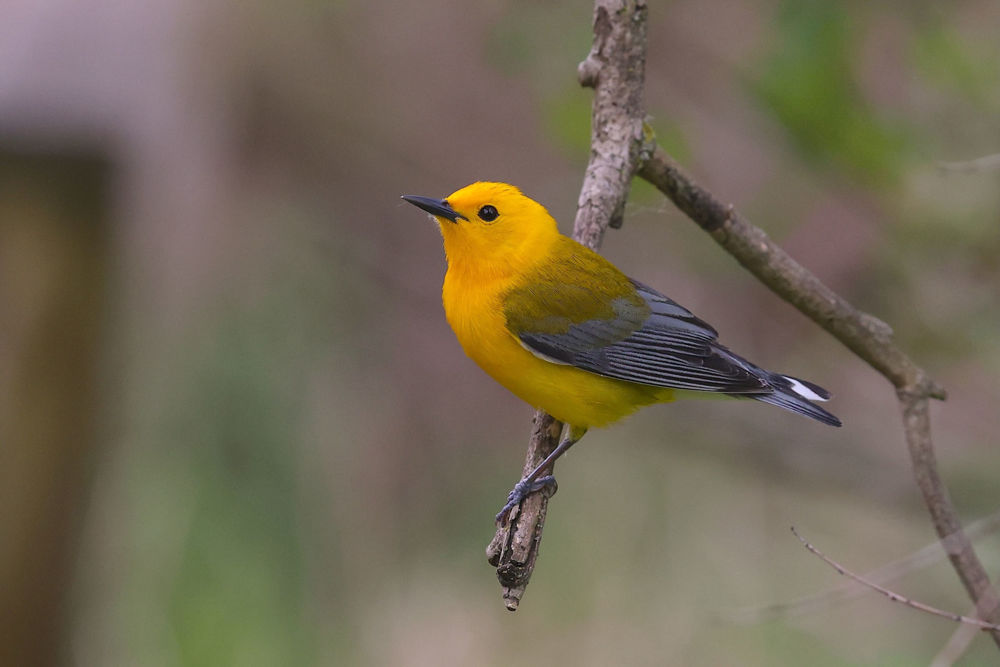
Prothonotary Warbler © Michael O'Brien
We eased into this tour with delightful weather on our first day as we explored the picturesque Cuyahoga Valley National Park and the quaint town of Peninsula. This area, with its rolling hills and windy roads, had a real Appalachian feel, and birdlife reflected that. Some highlights on that first morning included Red-headed Woodpecker, Scarlet Tanager, Ovenbird, and Yellow-throated, Hooded, and Blue-winged warblers. As an added bonus that day, we made a quick stop on the drive to Maumee Bay to check out a flooded field that was full of migrant shorebirds. Most were Dunlin (about 600), but the real prize was a female Ruff, a Eurasian species that is a rarity anywhere in the U.S.
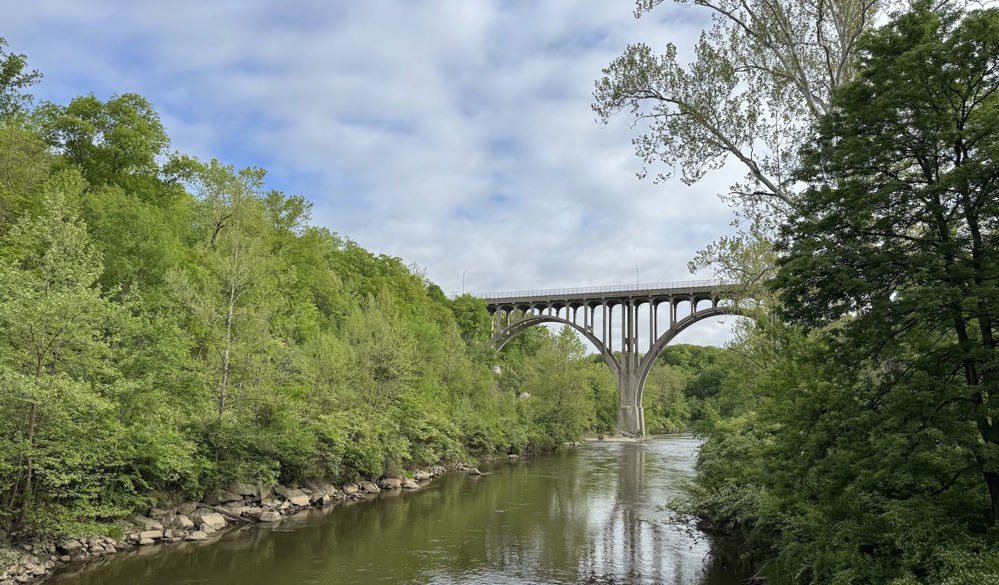
Station Road Bridge © Michael O'Brien
During the next two days, we spent most of our time at the famous Magee Marsh and witnessed firsthand why this place is so legendary. With cloudy skies, cool temperatures, and a stiff northeast wind, migrant songbirds were pinned down and collecting at low spots out of the wind where they could find insects to feed on. Over and over, we were dazzled by migrants practically at arm’s reach: Alder and Least flycatchers, Philadelphia and Red-eyed vireos, Veery, Gray-cheeked and Swainson’s thrushes, White-crowned and White-throated sparrows, and 23 warbler species including such stunners as Prothonotary, Cape May, Magnolia, Bay-breasted, Blackburnian, Chestnut-sided, and Canada. We left Magee downright stunned by the show of colors we had seen! And one evening, a hardy few went out in the rain to look for displaying American Woodcock and were treated to surprisingly good views of a stubborn bird that insisted on displaying despite the conditions!
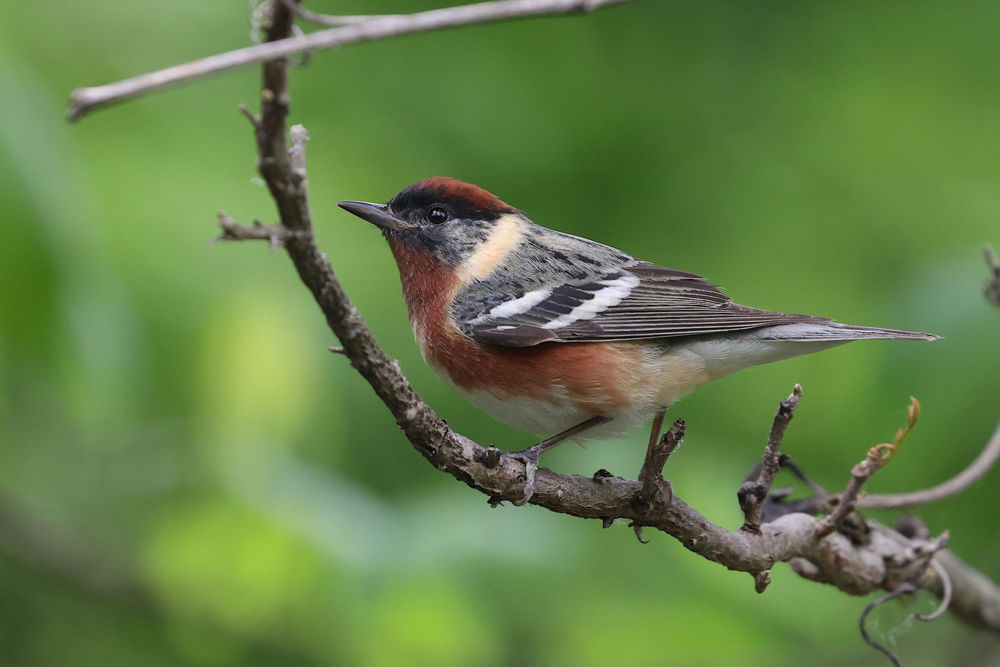
Bay-breasted Warbler © Michael O'Brien
Moving on to southern Michigan, we made a stop at Park Lyndon and nearby B2B trailhead to search for several breeding songbirds. A bit of patience was required, but we ended up with nice views of the canopy-loving Cerulean Warbler, plus Blue-winged and Pine warblers. At nearby Waterloo State Recreation Area, we enjoyed seeing Sandhill Crane, Eastern Bluebird, and Eastern Meadowlark, and had a very close singing Henslow’s Sparrow that revealed itself to only a few group members. As we headed north, we made a stop along the shores of Lake Huron at Nayanquing Point State Wildlife Area. The freshwater marsh here is an oasis for wildlife and held a number of interesting species, including Northern Shoveler, Caspian Tern, Pied-billed Grebe, Black-crowned Night Heron, Peregrine Falcon, Yellow-headed Blackbird, and loads of swallows.
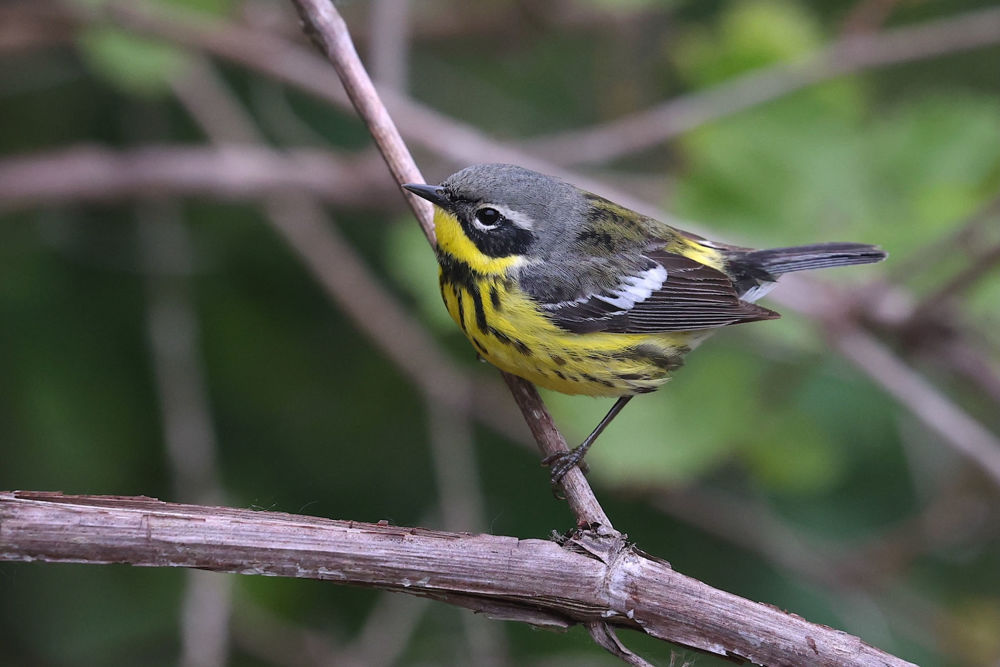
Magnolia Warbler © Michael O'Brien
The final segment of our tour was based in Tawas City, the ideal home base for exploring the central Michigan Jack Pine plains where the very local Kirtland’s Warbler nests. We devoted the early part of two mornings to look for this species and had good views on both days. In the same habitat, we found a number of other interesting species including American Kestrel, Olive-sided Flycatcher, Brown Thrasher, Vesper and Lincoln’s sparrows, and Nashville and Palm warblers. And an evening visit to that same habitat was simply mesmerizing as we enjoyed a dusk chorus of Hermit Thrush, Lincoln’s Sparrow, Kirtland’s Warbler, and others, and had fine views of Eastern Whip-poor-will.
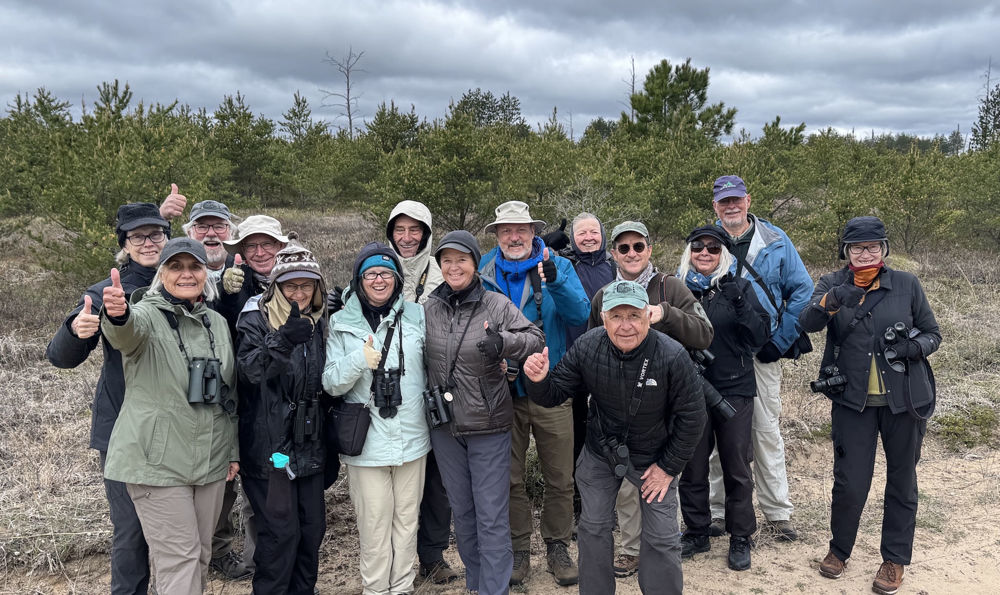
Kirtland's Warbler success! © Michael O'Brien
Our luck with migrant songbirds continued with a visit to Sturgeon Point Lighthouse, where, between rain squalls, we witnessed an amazing frenzy of activity with sixteen species of warblers, many offering superb views. Numerous shorebirds and terns along the beach were an added bonus. In our wanderings through the Lower Peninsula, we were pleased to come across a few fields with spectacular Bobolinks and a beach with a lone Piping Plover, a scarce breeder in the region. A stroll through a patch of boreal forest along the Big Creek Boardwalk was another top highlight, as we found numerous exciting species including Golden-crowned Kinglet, Red-breasted Nuthatch, Brown Creeper, Winter Wren, Purple Finch, and Rose-breasted Grosbeak, plus ten species of warblers including nice looks at Ovenbird, Black-and-white, Nashville, Cape May, Magnolia, Pine, and Yellow-rumped.
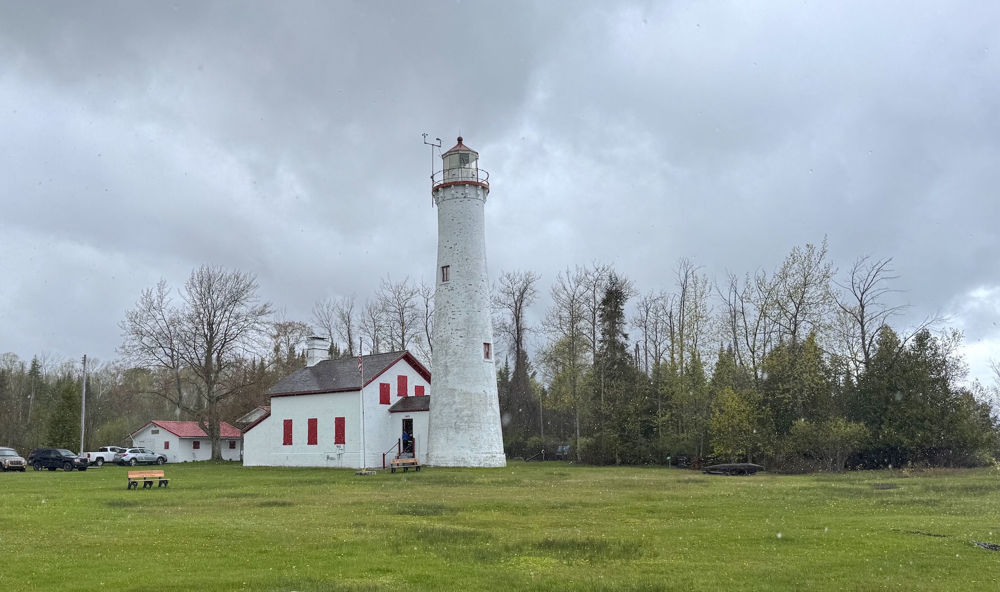
Sturgeon Point © Michael O'Brien
On the final morning of our tour, before traveling south to Detroit, we visited Au Sable State Forest, a rich mosaic of hardwood forest, swamp, bog, and edge habitats. Here, we added our final warbler species of the tour with some nice views of Golden-winged Warbler, along with excellent views of Chestnut-sided Warbler, American Redstart, Yellow-bellied Sapsucker, Great Crested Flycatcher, and a drumming Ruffed Grouse. As the tour drew to a close, we were all brimming with satisfaction from our Midwest experience, between some amazing birds, charming local restaurants, and a wonderful group of fellow travelers. May we all cross paths again soon!
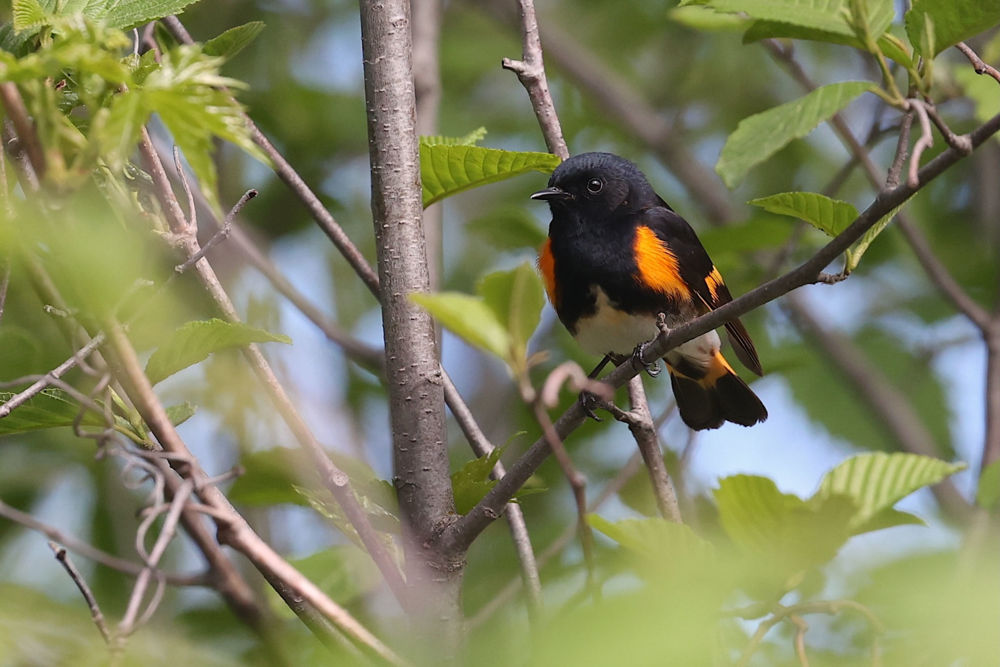
American Redstart © Michael O'Brien
A complete list of the birds recorded on our tour can be found at: https://ebird.org/tripreport/375732
Read the description for the next departure of this tour.
View Michael O'Brien's upcoming tour schedule.
View Louise Zemaitis's upcoming tour schedule.
ITINERARY:
May 18: Arrivals in Cleveland and 6:00 p.m. meeting at the hotel lobby; night at Home2 Suites, Middleburg Heights.
May 19: Cuyahoga Valley National Park (Station Road Towpath and Oak Hill Trails); Deep Lock Quarry Metro Park; Barnside Creamery; night at Maumee Bay Lodge & Conference Center.
May 20: Magee Marsh Wildlife Area; Howard Marsh Metropark; dusk outing for American Woodcock at Maumee Bay State Park; night at Maumee Bay Lodge & Conference Center.
May 21: Magee Marsh Wildlife Area; Oak Openings Preserve Metropark; night at Holiday Inn Express & Suites, Ann Arbor.
May 22: Park Lyndon County Park; B2B Trailhead; Waterloo State Recreation Area (Riethmiller Road grasslands); Nayanquing Point State Wildlife Area; night at Tawas Bay Beach Resort.
May 23: Huron-Manistee National Forest (Kobs Road); Wilber Road; Shoreline Park (Au Sable); Oscoda-Wurtsmith Airport; Sturgeon Point State Park; night at Tawas Bay Beach Resort.
May 24: M-55 flooded field; Huron-Manistee National Forest (Hunt Road); Luzerne (Big Creek) Boardwalk; Black Road grasslands & wetlands; dusk outing to Huron-Manistee National Forest (Kobs Road); night at Tawas Bay Beach Resort.
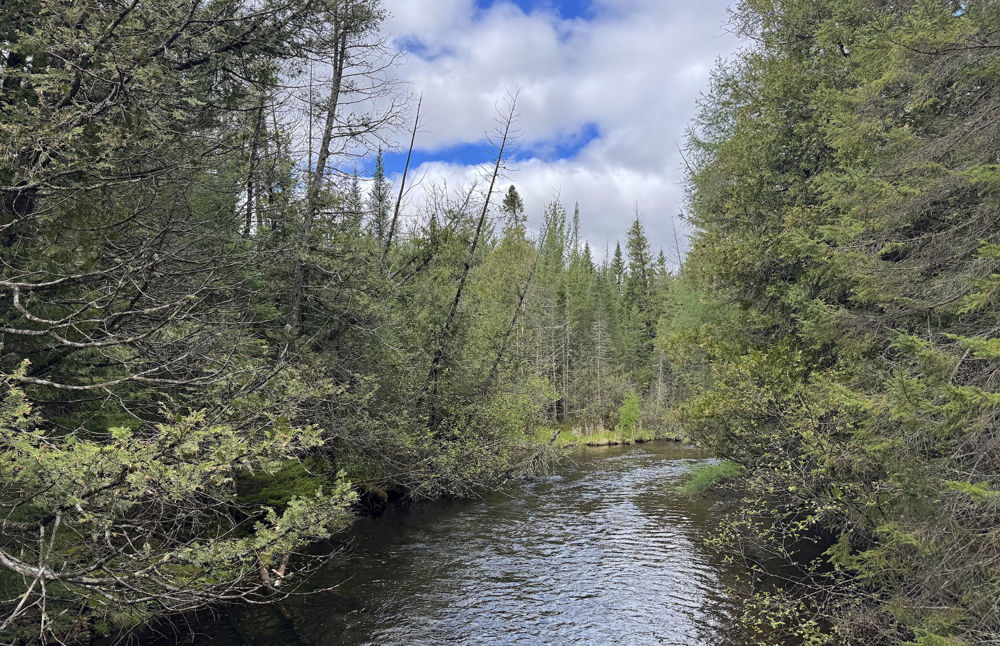
Big Creek Boardwalk © Michael O'Brien
May 25: Au Sable State Forest; Point Au Gres Nature Lookout; drive to Detroit; night at Courtyard by Marriott Detroit Metro Airport, Romulus.
May 26: Departures from Detroit.

